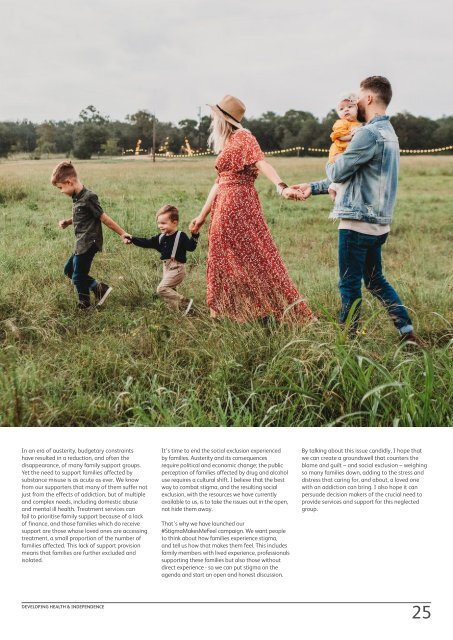The Vision Project
Throughout 2019, Developing Health & Independence (DHI), have been marking their 20th anniversary as a charity by looking to the future. Through articles, events and podcasts, they've asked people to answer the question of how we can achieve their vision of ending social exclusion. This collection of articles includes the contributions of experts from across public life and the political spectrum.
Throughout 2019, Developing Health & Independence (DHI), have been marking their 20th anniversary as a charity by looking to the future. Through articles, events and podcasts, they've asked people to answer the question of how we can achieve their vision of ending social exclusion. This collection of articles includes the contributions of experts from across public life and the political spectrum.
You also want an ePaper? Increase the reach of your titles
YUMPU automatically turns print PDFs into web optimized ePapers that Google loves.
In an era of austerity, budgetary constraints<br />
have resulted in a reduction, and often the<br />
disappearance, of many family support groups.<br />
Yet the need to support families affected by<br />
substance misuse is as acute as ever. We know<br />
from our supporters that many of them suffer not<br />
just from the effects of addiction, but of multiple<br />
and complex needs, including domestic abuse<br />
and mental ill health. Treatment services can<br />
fail to prioritise family support because of a lack<br />
of finance, and those families which do receive<br />
support are those whose loved ones are accessing<br />
treatment, a small proportion of the number of<br />
families affected. This lack of support provision<br />
means that families are further excluded and<br />
isolated.<br />
It’s time to end the social exclusion experienced<br />
by families. Austerity and its consequences<br />
require political and economic change; the public<br />
perception of families affected by drug and alcohol<br />
use requires a cultural shift. I believe that the best<br />
way to combat stigma, and the resulting social<br />
exclusion, with the resources we have currently<br />
available to us, is to take the issues out in the open,<br />
not hide them away.<br />
That’s why we have launched our<br />
#StigmaMakesMeFeel campaign. We want people<br />
to think about how families experience stigma,<br />
and tell us how that makes them feel. This includes<br />
family members with lived experience, professionals<br />
supporting these families but also those without<br />
direct experience - so we can put stigma on the<br />
agenda and start an open and honest discussion.<br />
By talking about this issue candidly, I hope that<br />
we can create a groundswell that counters the<br />
blame and guilt – and social exclusion – weighing<br />
so many families down, adding to the stress and<br />
distress that caring for, and about, a loved one<br />
with an addiction can bring. I also hope it can<br />
persuade decision makers of the crucial need to<br />
provide services and support for this neglected<br />
group.<br />
DEVELOPING HEALTH & INDEPENDENCE<br />
25




